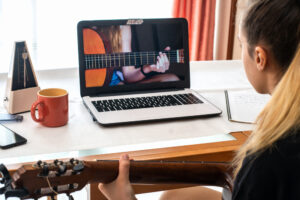When first exploring music, many beginners—and their families—wonder if online instruction is effective. From our experience as private music teachers working with beginners, those virtual music lessons benefits are real and powerful, offering opportunities that can surpass traditional in-person lessons while still fostering connection and skill-building.
Flexibility and Convenience
One of the top advantages of virtual lessons is their flexibility:
- Learn from home—no travel time
- Choose lesson times that fit the family schedule
- Maintain lessons during illness or travel
This convenience is especially helpful for busy families or adult learners working around changing schedules. Platforms like Zoom, Skype, or dedicated learning apps let students focus on growth, not going places.
Personalized and Effective Instruction
Online lessons allow for tailored experiences:
- One-on-one attention: Teachers adapt pacing and repertoire to each student’s level.
- Access to specialist teachers: Families can connect with instructors beyond their local area—a huge benefit for niche instruments or styles.
- Lesson recordings: Some platforms offer recorded sessions so learners can revisit content for better retention. Research shows students retain 25–60% more material online than in traditional classrooms
Ideal for Beginner Instruments
Virtual instruction works well across a range of beginner instruments:
- Ukulele and guitar: finger placement and strumming are easy to demonstrate on camera
- Drums and percussion: rhythm exercises and technique can be guided remotely
- Voice, piano, strings: with proper audio setup, tone and posture are still teachable online
Online tools—like metronome apps and digital sheet music—make technical guidance both accurate and engaging.
Science-Backed Advantages
Research supports many benefits of virtual learning:
- More focused and better performing students online.
- Increased family involvement and mental well-being.
- Improved spatial-temporal reasoning and academic skills linked to music study.
For additional tips on setting up a successful virtual learning space, Common Sense Media offers practical guidance trusted by educators and families alike.
FAQ
Are virtual music lessons as good as in-person?
Yes—especially for beginners. Quality depends more on instructor engagement and student discipline than the format.
What about technical challenges?
Good camera angles and clear audio are key. Many issues can be solved by using headphones and stable Wi-Fi, or by occasionally blending in-person check-ins.
How do I motivate my child online?
Record sessions for review, set small weekly goals, and integrate creative activities. Many platforms allow shared files and practice trackers, making learning interactive and fun.
